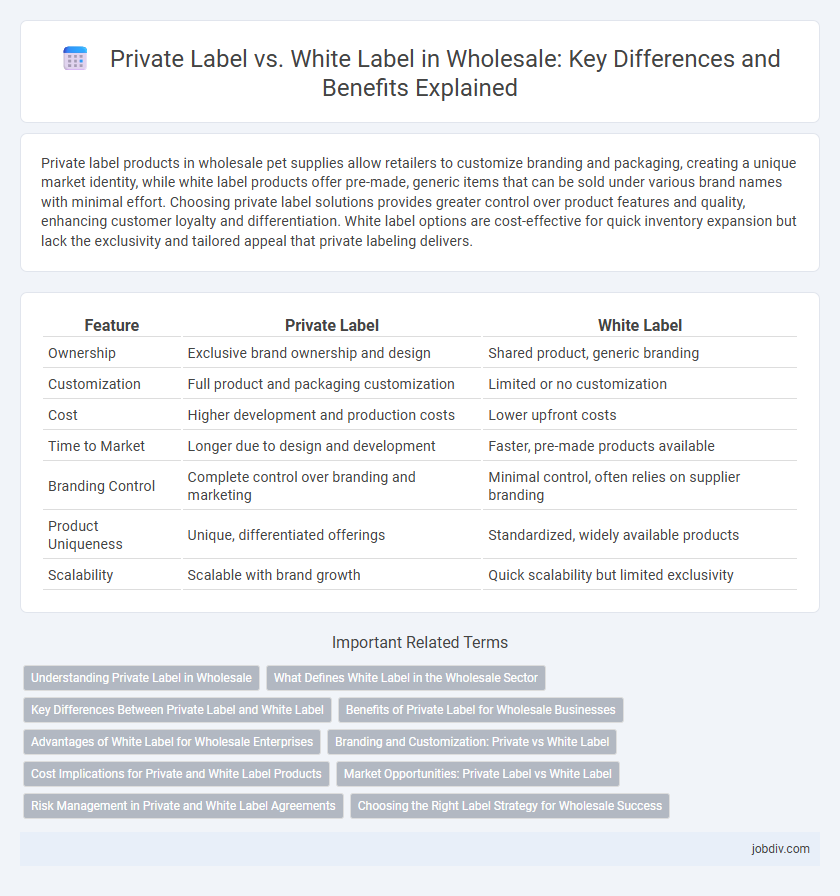Private label products in wholesale pet supplies allow retailers to customize branding and packaging, creating a unique market identity, while white label products offer pre-made, generic items that can be sold under various brand names with minimal effort. Choosing private label solutions provides greater control over product features and quality, enhancing customer loyalty and differentiation. White label options are cost-effective for quick inventory expansion but lack the exclusivity and tailored appeal that private labeling delivers.
Table of Comparison
| Feature | Private Label | White Label |
|---|---|---|
| Ownership | Exclusive brand ownership and design | Shared product, generic branding |
| Customization | Full product and packaging customization | Limited or no customization |
| Cost | Higher development and production costs | Lower upfront costs |
| Time to Market | Longer due to design and development | Faster, pre-made products available |
| Branding Control | Complete control over branding and marketing | Minimal control, often relies on supplier branding |
| Product Uniqueness | Unique, differentiated offerings | Standardized, widely available products |
| Scalability | Scalable with brand growth | Quick scalability but limited exclusivity |
Understanding Private Label in Wholesale
Private label in wholesale involves products manufactured by one company and branded by another retailer to create unique offerings exclusive to their store. This strategy allows retailers to differentiate themselves, control pricing, and foster brand loyalty while outsourcing production. Emphasizing private label products can increase profit margins and strengthen market position through customized branding and tailored product features.
What Defines White Label in the Wholesale Sector
White label in the wholesale sector refers to products manufactured by one company and rebranded by another for resale, allowing retailers to offer items without investing in production. These products typically come with generic features, enabling bulk buyers to customize packaging and branding to suit their market identity. The emphasis on scalability and cost-efficiency makes white label solutions ideal for wholesalers aiming to expand product lines quickly with minimal upfront development.
Key Differences Between Private Label and White Label
Private Label products are exclusively manufactured for a single retailer, allowing unique branding and customization, while White Label products are generic items sold to multiple retailers under different brands with minimal modification. Private Label offers greater control over product design, quality, and marketing, whereas White Label emphasizes convenience and lower entry costs with pre-made products. These distinctions impact wholesale strategies by influencing product differentiation, brand identity, and pricing flexibility.
Benefits of Private Label for Wholesale Businesses
Private label products enable wholesale businesses to build stronger brand identity and customer loyalty by offering unique, customizable items tailored to their target market. This strategy allows higher profit margins due to reduced competition and greater control over pricing, marketing, and product quality. Private labeling also facilitates scalability and market differentiation, empowering wholesalers to expand their product lines and establish a competitive edge in the industry.
Advantages of White Label for Wholesale Enterprises
White label products streamline inventory management and accelerate market entry for wholesale enterprises by offering pre-manufactured goods ready for branding. This approach reduces production costs and mitigates risks related to product development and quality control. Leveraging established white label suppliers enhances scalability and allows wholesalers to focus on marketing and distribution strategies, driving higher profit margins.
Branding and Customization: Private vs White Label
Private label products offer extensive branding and customization options, allowing retailers to create unique packaging, logos, and product formulations tailored to their target market. In contrast, white label products provide pre-made goods with generic branding, limiting customization to minor changes like labels or packaging colors. Businesses seeking distinct market identity and brand loyalty typically prefer private label solutions over white label alternatives.
Cost Implications for Private and White Label Products
Private label products often require higher upfront costs due to customization, branding, and packaging expenses, whereas white label products are typically more cost-effective with lower minimum order quantities and faster time-to-market. Manufacturers of private label items invest in unique design and product development, increasing initial investment but allowing for greater profit margins. White label options minimize risk and expense by selling generic products under a retailer's brand, making them ideal for businesses seeking lower-cost entry points.
Market Opportunities: Private Label vs White Label
Private label products offer wholesalers greater control over branding and product customization, enabling targeted market differentiation and higher profit margins. White label products provide quicker market entry with established products, appealing to businesses aiming to reduce development costs and time. Market opportunities favor private labels in niches demanding unique branding, while white labels excel in standardized product categories with high demand.
Risk Management in Private and White Label Agreements
Private label agreements expose wholesalers to higher risk management challenges due to product customization and brand ownership responsibilities, requiring strict quality control and compliance monitoring. White label arrangements offer reduced risk by using generic products under the wholesaler's brand, minimizing liability for manufacturing defects and regulatory issues. Effective risk management in both models involves clear contractual terms, regular supplier audits, and comprehensive product liability insurance to protect against market and reputational risks.
Choosing the Right Label Strategy for Wholesale Success
Choosing the right label strategy in wholesale hinges on brand control and customization needs; private label products offer exclusive branding and product modification, enhancing market differentiation. White label products provide a cost-effective option with ready-made goods allowing faster market entry but limited uniqueness. Evaluating target audience preferences and long-term brand goals ensures alignment with either private or white label to maximize wholesale profitability and customer loyalty.
Private Label vs White Label Infographic

 jobdiv.com
jobdiv.com